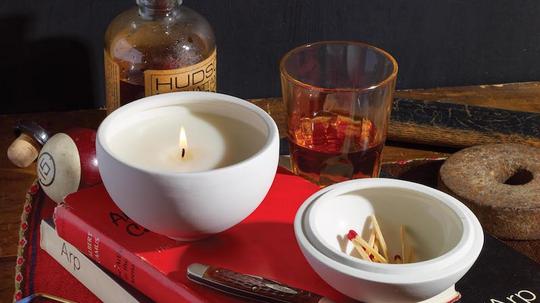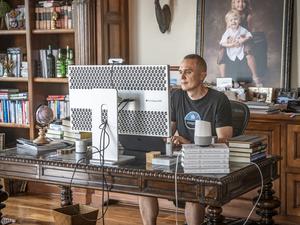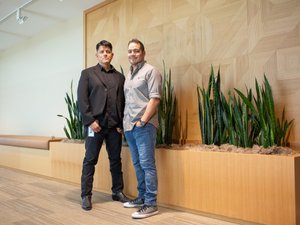
Fragrances have been around since ancient Egypt -- even the Pharaoh wanted to smell good.
When Phlur founder Eric Korman went into Barneys New York on a lunch break from his previous job as president of digital and global e-commerce at Ralph Lauren one day, he decided he wanted to do the same. Korman, who hadn't worn cologne since he was 13, was mesmerized by the fragrances that existed within the halls of the famous New York City department store. It smelled different, and it got him thinking about taking a deeper dive in the fragrance world.
“After reading a lot about fragrance, I found that it was a $6 billion to $8 billion dollar industry, but the market had been flat for over a decade,” Korman said. “Fragrances were not connecting with young people.”
The Founding of Phlur
The idea of Phlur didn’t just come out of nowhere for Korman. In his previous occupation running global ecommerce operations for Ralph Lauren, he was constantly thinking about the evolution of retail, while paying close attention to how brands like Warby Parker implemented successful digital-first strategies.
“What I found was that there was a change in expectations for a younger subset of younger customers about brands,” Korman said. “Brands moved from being about a badge to a belief system, and social media had changed the game when it came to how people want to hear about brands.”
From there, Korman set about creating Phlur, stepping down from his high-paying role at Ralph Lauren, and leaving New York for Austin in the process. Thanks to a serendipitous dinner one night at Lambert’s with Tom Ball of Next Coast Ventures, Korman found a partner who could back him in his quest to reimagine fragrance.
“There are plenty of barriers in the fragrance world, so how do you make it smell good?”
There was plenty of familiarity between the two men.
They both were in the ticketing industry. Korman used to be the president of Ticketmaster, and Ball worked for RazorGator. When Ball was on the board of RetailMeNot, Inc. and the company went public, Korman was soon added to the company's board. So when Korman told Ball about his idea for Phlur, Ball was hooked, and knew the right person was at the helm.
“If you look at something I call 'founder market fit' Eric is a 10/10,” Ball said. “I’ve only had one other deal where someone passed up a high-paying job and moved to Austin, and that one turned out pretty well (Cotter Cunningham, CEO of RetailMeNot). ”
Ball said the deal crossed multiple themes for Next Coast Ventures, including how it relates to suppliers and retailers. In addition, Phlur was a great fit for Next Coast based on an ecommerce algorithm that Ball developed that evaluates e-commerce companies through metrics such as the size of the industry, gross margin, various key metrics and shipping costs.
“There are plenty of barriers in the fragrance world, so how do you make it smell good?” Ball said.
The Technology Behind Phlur
Korman pointed out that most fragrance companies list three ingredients on their product: water, alcohol and fragrance.
“That’s not super helpful,” he said.
Phlur publishes an extensive list of their ingredients online, while also working with the International Union for Conservation of Nature to ensure the raw materials they source do not endanger the ecosystem. One interesting ingredient Phlur uses in its fragrances is vetiver, and it is the first company to use vetiver sourced from Madagascar.
Korman also wanted to differentiate Phlur through its packaging.
Fragrances from Phlur are housed in opaque bottles made from 20 percent recycled glass, compared to other fragrance bottles, which are typically in clear bottles that are susceptible to light damage. The packaging development allows Phlur fragrances to not contain BHT or food coloring, ingredients that Korman says aren’t great for someone to put on their body.
One of the biggest ideas behind Phlur is championing the perfumer as an artist.

The Phlur team created visual storyboards, and they put the smell in the hands of the perfumer. The development cycle of the fragrances takes anywhere from eight to ten months, and Korman notes the only limit for the perfumer was what they put in the bottle from an efficacy standpoint.
“It’s the idea that you smell with your eyes first, which we learned from a woman who has a degree in psychology,” Korman said.
To tie together the inspiration behind the fragrance, the Phlur team embedded a Spotify playlist on each of the product detail pages.
A New In-Home Experience
When the Phlur team was in the initial stages of developing the fragrances, they found a lot of potential customers had a poor sampling experience with other fragrances. Those who wanted fragrances would go to a department store, sample perfumes, buy one after five to 10 minutes and end up not liking the fragrance once they went home.
Phlur created a three scent sample pack that contains 15 to 20 sprays in each bottle, for $18. Customers can apply the $18 to their first Phlur bottle, priced at $80, and give leftover samples to their friends to try. The team wanted to create a positive in-home experience for potential consumers, a “fair trade” as Korman puts it.
Growth
With business coming from everywhere, Korman said Phlur is primed for growth in 2018 and beyond. In addition to rolling out new fragrances and candles, the company is planning to launch scented body care products. While Phlur’s major business comes from New York City, Los Angeles and Austin, the company is getting interest from plenty of markets.
Korman said Columbus is an example of a city where there aren't a lot of artisanal fragrance brands, but where the Phlur's price point fits with some of the department store brands that residents are used to. The coming year will also see growth internally for the company, as Phlur is on the hunt for a marketing leader, and externally, with possible retail distributions.
Future success never smelled so good.
Editor's Note: This story has been updated to reflect a few corrections. It was corrected to show Korman hadn't worn fragrances since he was 13; Ball was only on the board at RetailMeNot and did not appoint Korman (the Governance committee of the board did that); Phlur's bottles don't use BHT; and the wording of a quote has been clarified.







